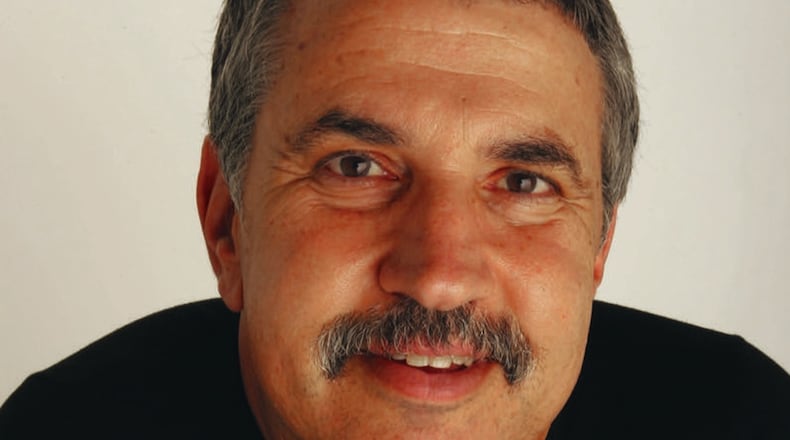Thomas L. Friedman, Pulitzer Prize-winning columnist for The New York Times, doesn’t call it the cloud.
The term “cloud” implies something that is soft and fluffy. He prefers to see this massive online computing capability as a white-hot fire hose of energy, so he calls it the “supernova.”
Among new developments, he writes, “it is not an exaggeration to suggest that it’s becoming more profound than fire and electricity.”
The supernova is one of the three forces that Friedman writes about in his latest book, "Thank You for Being Late: An Optimist's Guide to Thriving in the Age of Accelerations," a book he will discuss Wednesday, Feb. 1, at the Marcus Jewish Community Center of Atlanta.
The event is an extension of the MJCCA Book Festival, held in November. It’s part of a series of appetizers that the center serves during the year to get ready for the main course this fall.
While Friedman has regularly written about technology, he found it increasingly challenging to stay current during the three years that he spent reporting and writing the book.
He had to return two or three times to many of his principal interviewees, including Brian Krzanich of Intel and Doug Cutting, founder of Hadoop (the open-source software that has made searching big data practical), to make sure he was keeping up with the changes over those three years.
Despite those efforts, “I felt I had a butterfly net, and I was chasing a butterfly, and every time I got close, it moved.”
The rest of us have the same problem. As the rate of technology change accelerates, it has outstripped our ability to adjust. We are also struggling to catch up to climate change and globalization, the other two “accelerations” that challenge us.
On his way to Davos, Switzerland, for the World Economic Forum, Friedman took a moment to talk about these changes — and the bright side of his research that justifies the optimism of his subtitle.
The upside of the supernova, he writes, is that “it creates a tremendous release of energy into the hands of human beings to compete, design, think, imagine, connect and collaborate with anyone anywhere. … We simply have never had a tool like this.”
One of the downsides is that it also allows a 36-year-old geek in his parents' London apartment to "spoof" the market, driving the Dow Jones down 9 percent in a "flash crash."
“I’m always aware that globalization and technology are everything and their opposite,” said Friedman. “They can be democratizing and authoritarian, incredibly empowering and disempowering, particularizing and homogenizing.”
Fear of globalization is one of the drivers of contemporary political culture. Though Friedman turned over his manuscript before the election, he saw that wave coming.
“People who are hurt by trade know exactly who they are,” he said. “People who have benefited by trade have no idea who they are. They don’t know how much the company they are working for depends on foreign trade, and depends on foreign markets and suppliers; how many goods around the house come from a foreign market.”
And it is automation, not globalization, that is the chief consumer of American jobs. “I happen to think the biggest thing devouring new jobs is not foreign trade,” he said. “Microchips are eating new jobs, not Mexicans.”
Yet automation often works counterintuitively, he writes. Automated tellers made conventional tellers obsolete, yet they also made it possible for banks to open more branches. The result: more jobs for tellers, not fewer.
He encounters another cause for optimism when he visits his hometown of St. Louis Park, outside Minneapolis, and sees how the community that was “magical” when he was young has survived.
“My book is a celebration of everything old and slow that you cannot download, that you have to upload the old-fashioned way,” he said. “Good parenting; good religious leadership; good community leadership: Those are the things that matter, not the number of Facebook friends you have.
“It is an argument for anchoring people in community, in associations, in relationships between and with other people. That’s where people develop the golden rule, where you learn to do unto others as you wish them to do unto you.”
EVENT PREVIEW
Thomas Friedman
Book talk, Q&A, signing
7:30 p.m. Wednesday, Feb. 1. $24; members, $18. Marcus Jewish Community Center of Atlanta, 5342 Tilly Mill Road, Dunwoody. 678-812-4005, www.atlantajcc.org/bookfestival. Books will be available for purchase from A Cappella Books, the official bookseller of the festival.
About the Author
Keep Reading
The Latest
Featured




